- Home
- William Gibson
Mona Lisa Overdrive Page 3
Mona Lisa Overdrive Read online
Page 3
Her Lear arrived an hour later; she told it to take her to LAX, ordered a car to meet her there, and canceled all incoming calls.
“I’m sorry, Angela,” the jet said, banking over Montego Bay seconds after they’d taken off, “but I have Hilton Swift on executive override.”
“Angie,” Swift said, “you know I’m behind you all the way. You know that, Angie.”
She turned to stare at the black oval of the speaker. It was centered in smooth gray plastic, and she imagined him crouching back there, his long runner’s legs folded painfully, grotesquely, behind the Lear’s bulkhead.
“I know that, Hilton,” she said. “It’s nice of you to phone.”
“You’re going to L.A., Angie.”
“Yes. That’s what I told the plane.”
“To Malibu.”
“That’s right.”
“Piper Hill is on her way to the airport.”
“Thank you, Hilton, but I don’t want Piper there. I don’t want anybody. I want a car.”
“There’s no one at the house, Angie.”
“Good. That’s what I want, Hilton. No one at the house. The house, empty.”
“Are you certain that’s a good idea?”
“It’s the best idea I’ve had in a long time, Hilton.”
There was a pause. “They said it went really well, Angie, the treatment. But they wanted you to stay.”
“I need a week,” she said. “One week. Seven days. Alone.”
After her third night in the house, she woke at dawn, made coffee, dressed. Condensation stippled the broad window facing the deck. Sleep had been simply that; if dreams had come, she couldn’t recall them. But there was something—a quickening, almost a giddiness. She stood in the kitchen, feeling the cold of the ceramic floor through thick white sweatsocks, both hands around the warm cup.
Something there. She extended her arms, raising the coffee like a chalice, the gesture at once instinctive and ironic.
It had been three years since the loa had ridden her, three years since they had touched her at all. But now?
Legba? One of the others?
The sense of a presence receded abruptly. She put the cup down on the counter too quickly, coffee slopping over her hand, and ran to find shoes and a coat. Green rubber boots from the beach closet, and a heavy blue mountain jacket she didn’t remember, too large to have been Bobby’s. She hurried out of the house, down the stairs, ignoring the hum of the toy Dornier’s prop as it lifted off behind her like a patient dragonfly. She glanced north, along the jumble of beach houses, the confusion of rooflines reminding her of a Rio barrio, then turned south, toward the Colony.
The one who came was named Mamman Brigitte, or Grande Brigitte, and while some think her the wife of Baron Samedi, others name her “most ancient of the dead.”
The dream architecture of the Colony rose to Angie’s left, a riot of form and ego. Frail-looking neon-embedded replicas of the Watts Towers lifted beside neo-Brutalist bunkers faced with bronze bas-reliefs.
Walls of mirror, as she passed, reflected morning banks of Pacific cloud.
There had been times, during the past three years, when she had felt as though she were about to cross, or recross, a line, a subtle border of faith, to find that her time with the loa had been a dream, or, at most, that they were contagious knots of cultural resonance remaining from the weeks she’d spent in Beauvoir’s New Jersey oumphor. To see with other eyes: no gods, no Horsemen.
She walked on, comforted by the surf, by the one perpetual moment of beach-time, the now-and-always of it.
Her father was dead, seven years dead, and the record he’d kept of his life had told her little enough. That he’d served someone or something, that his reward had been knowledge, and that she had been his sacrifice.
Sometimes she felt as though she’d had three lives, each walled away from the others by something she couldn’t name, and no hope of wholeness, ever.
There were the child’s memories of the Maas arcology, carved into the summit of an Arizona mesa, where she’d hugged a sandstone balustrade, face into the wind, and felt as though the whole hollowed tableland was her ship, that she could steer out into those sunset colors beyond the mountains. Later, she’d flown away from there, her fear a hard thing in her throat. She could no longer recall her last glimpse of her father’s face. Though it must have been on the microlight deck, the other planes tethered against the wind, a row of rainbow moths. The first life ended, that night; her father’s life had ended too.
Her second life had been a short one, fast and very strange. A man called Turner had taken her away, out of Arizona, and had left her with Bobby and Beauvoir and the others. She remembered little about Turner, only that he was tall, with hard muscles and a hunted look. He’d taken her to New York. Then Beauvoir had taken her, along with Bobby, to New Jersey. There, on the fifty-third level of a mincome structure, Beauvoir had taught her about her dreams. The dreams are real, he’d said, his brown face shining with sweat. He taught her the names of the ones she’d seen in dreams. He taught her that all dreams reach down to a common sea, and he showed her the way in which hers were different and the same. You alone sail the old sea and the new, he said.
She was ridden by gods, in New Jersey.
She learned to abandon herself to the Horsemen. She saw the loa Linglessou enter Beauvoir in the oumphor, saw his feet scatter the diagrams outlined in white flour. She knew the gods, in New Jersey, and love.
The loa had guided her, when she’d set out with Bobby to build her third, her current life. They were well matched, Angie and Bobby, born out of vacuums, Angie from the clean blank kingdom of Maas Biolabs and Bobby from the boredom of Barrytown.…
Grande Brigitte touched her, without warning; she stumbled, almost fell to her knees in the surf, as the sound of the sea was sucked away into the twilit landscape that opened in front of her. The whitewashed cemetery walls, the gravestones, the willows. The candles.
Beneath the oldest willow, a multitude of candles, the twisted roots pale with wax.
Child, know me.
And Angie felt her there, all at once, and knew her for what she was, Mamman Brigitte, Mademoiselle Brigitte, eldest of the dead.
I have no cult, child, no special altar.
She found herself walking forward, into candleglow, a buzzing in her ears, as though the willow hid a vast hive of bees.
My blood is vengeance.
Angie remembered Bermuda, night, a hurricane; she and Bobby had ventured out into the eye. Grande Brigitte was like that. The silence, the sense of pressure, of unthinkable forces held momentarily in check. There was nothing to be seen, beneath the willow. Only the candles.
“The loa … I can’t call them. I felt something … I came looking.…”
You are summoned to my reposoir. Hear me. Your father drew vévés in your head: he drew them in a flesh that was not flesh. You were consecrated to Ezili Freda. Legba led you into the world to serve his own ends. But you were sent poison, child, a coup-poudre …
Her nose began to bleed. “Poison?”
Your father’s vévés are altered, partially erased, redrawn. Though you have ceased to poison yourself, still the Horsemen cannot reach you. I am of a different order.
There was a terrible pain in her head, blood pounding in her temples.… “Please …”
Hear me. You have enemies. They plot against you. Much is at stake, in this. Fear poison, child!
She looked down at her hands. The blood was bright and real. The buzzing sound grew louder. Perhaps it was in her head. “Please! Help me! Explain …”
You cannot remain here. It is death.
And Angie fell to her knees in the sand, the sound of the surf crashing around her, dazzled by the sun. The Dornier was hovering nervously in front of her, two meters away. The pain receded instantly. She wiped her bloodied hands on the sleeves of the blue jacket. The remote’s cluster of cameras whirred and rotated.
“It’s all right,”
she managed. “A nosebleed. It’s only a nosebleed.…” The Dornier darted forward, then back. “I’m going back to the house now. I’m fine.” It rose smoothly out of sight.
Angie hugged herself, shaking. No, don’t let them see. They’ll know something happened, but not what. She forced herself to her feet, turned, began to trudge back up the beach, the way she’d come. As she walked, she searched the mountain jacket’s pockets for a tissue, anything, something to wipe the blood from her face.
When her fingers found the corners of the flat little packet, she knew instantly what it was. She halted, shivering. The drug. It wasn’t possible. Yes, it was. But who? She turned and stared at the Dornier until it slid away.
The packet. Enough for a month.
Coup-poudre.
Fear poison, child.
4
SQUAT
Mona dreamed she was dancing the cage back in some Cleveland juke, naked in a column of hot blue light, where the faces thrusting up for her through the veil of smoke had blue light snagged in the whites of their eyes. They wore the expression men always wore when they watched you dance, staring real hard but locked up inside themselves at the same time, so their eyes told you nothing at all and their faces, in spite of the sweat, might have been carved from something that only looked like flesh.
Not that she cared how they looked, when she was in the cage, high and hot and on the beat, three songs into the set and the wiz just starting to peak, new strength in her legs sending her up on the balls of her feet …
One of them grabbed her ankle.
She tried to scream, only it wouldn’t come, not at first, and when it did it was like something ripped down inside her, hurt her, and the blue light shredded, but the hand, the hand was still there, around her ankle. She came up off the bed like a pop-up toy, fighting the dark, clawing hair away from her eyes.
“Whatsa matter, babe?”
He put his other hand against her forehead and shoved her back, down into the pillow’s hot depression.
“Dream …” The hand was still there and it made her want to scream. “You got a cigarette, Eddy?” The hand went away, click and flare of the lighter, the planes of his face jumping out at her as he lit one, handed it to her. She sat up quickly, drew her knees up under her chin with the army blanket over them like a tent, because she didn’t feel like anybody touching her then at all.
The scavenged plastic chair’s broken leg made a warning sound as he leaned back and lit his own cigarette. Break, she thought, pitch him on his ass so he gets to hit me a few times. At least it was dark, so she didn’t have to look at the squat. Worst thing was waking up with a bad head, too sick to move, when she’d come in crashing and forgotten to retape the black plastic, hard sun to show her all the little details and heat the air so the flies could get going.
Nobody ever grabbed her, back in Cleveland; anybody numb enough to reach through that field was already too drunk to move, maybe to breathe. The tricks never grabbed her either, not unless they’d squared it with Eddy, paid extra, and that was just pretend.
Whichever way they wanted it, it got to be a kind of ritual, so it seemed to happen in a place outside your life. And she’d gotten into watching them, when they lost it. That was the interesting part, because they really did lose it, they were totally helpless, maybe just for a split second, but it was like they weren’t even there.
“Eddy, I’m gonna go crazy, I gotta sleep here anymore.”
He’d hit her before, for less, so she put her face down, against her knees and the blanket, and waited.
“Sure,” he said, “you wanna go back to the catfish farm? Wanna go back to Cleveland?”
“I just can’t take this anymore.…”
“Tomorrow.”
“Tomorrow what?”
“That soon enough for you? Tomorrow night, private fucking jet? Straight up to New York? Then you gonna quit giving me this shit?”
“Please, baby,” and she reached out for him, “we can take the train.…”
He slapped her hand away. “You got shit for brains.”
If she complained any more, anything about the squat, anything that implied he wasn’t making it, that all his big deals added up to nothing, he’d start, she knew he’d start. Like the time she’d screamed about the bugs, the roaches they called palmetto bugs, but it was because the goddamn things were mutants, half of them; someone had tried to wipe them out with something that fucked with their DNA, so you’d see these screwed-up roaches dying with too many legs or heads, or not enough, and once she’d seen one that looked like it had swallowed a crucifix or something, its back or shell or whatever it was distorted in a way that made her want to puke.
“Baby,” she said, trying to soften her voice, “I can’t help it, this place is just getting to me.…”
“Hooky Green’s,” he said, like he hadn’t heard her, “I was up in Hooky Green’s and I met a mover. He picked me out, you know? Man’s got an eye for talent.” She could almost feel his grin through the dark. “Outa London, England. Talent scout. Come into Hooky’s and it was just ‘You, my man!’ ”
“A trick?” Hooky Green’s was where Eddy had most recently decided the action was, thirty-third floor of a glass highstack with most of the inside walls knocked down, had about a block of dancefloor, but he’d gone off the place when nobody there was willing to pay him much attention. Mona hadn’t ever seen Hooky himself, “lean mean Hooky Green,” the retired ballplayer who owned the place, but it was great for dancing.
“Will you fucking listen? Trick? Shit. He’s the man, he’s a connection, he’s on the ladder and he’s gonna pull me up. And you know what? I’m gonna take you with me.”
“But what’s he want?”
“An actress. Sort of an actress. And a smart boy to get her in place and keep her there.”
“Actress? Place? What place?”
She heard him unzip his jacket. Something landed on the bed, near her feet. “Two thou.”
Jesus. Maybe it wasn’t a joke. But if it wasn’t, what the hell was it?
“How much you pull tonight, Mona?”
“Ninety.” It had really been one-twenty, but she’d figured the last one for overtime. She was too scared to hold out on him, usually, but she’d needed wiz money.
“Keep it. Get some clothes. Not like work stuff. Nobody wants your little ass hanging out, not this trip.”
“When?”
“Tomorrow, I said. You can kiss this place goodbye.”
When he said that, it made her want to hold her breath.
The chair creaked again. “Ninety, huh?”
“Yeah.”
“Tell me.”
“Eddy, I’m so tired.…”
“No,” he said.
But what he wanted wasn’t the truth or anything like it. He wanted a story, the story that he’d taught her to tell him. He didn’t want to hear what they talked about (and most of them had some one thing they wanted real bad to tell you, and usually they did), or how they got around to asking to see your Woodwork tickets, or how every other one made that same joke about how what they couldn’t cure they could put in remission, or even what they wanted in bed.
Eddy wanted to hear about this big guy who treated her like she didn’t matter. Except she had to be careful, when she told it, not to make the trick too rough, because that was supposed to cost more than she’d actually been paid. The main thing was that this imaginary trick had treated her like she was a piece of equipment he’d rented for half an hour. Not that there weren’t plenty like that, but they mostly spent their money at puppet parlors or got it on stim. Mona tended to get the ones who wanted to talk, who tried to buy you a sandwich after, which could be bad in its own way but not the kind of bad Eddy needed. And the other thing Eddy needed was for her to tell him how that wasn’t what she liked but she’d found herself wanting it anyway, wanting it bad.
She reached down in the dark and touched the envelope full of money.
The chair
creaked again.
So she told him how she was coming out of a BuyLow and he’d hit on her, this big guy, just asked how much, which had embarrassed her but she told him anyway and she’d said okay. So they went in his car, which was old and big and kind of damp-smelling (cribbing detail from her Cleveland days), and he’d sort of flipped her over the seat—
“In front of the BuyLow?”
“In back.”
Eddy never accused her of making any of it up, even though she knew he must have taught her the general outline somehow and it was always basically the same story. By the time the big guy had her skirt up (the black one, she said, and I had on my white boots) and his pants down, she could hear Eddy’s beltbuckle jingling as he peeled off his jeans. Part of her was wondering, when he slid into bed beside her, whether the position she was describing was physically possible, but she kept on going, and anyway it was working on Eddy. She remembered to put in how it hurt, when the guy was getting it in, even though she’d been really wet. She put in how he held her wrists, though by now she was pretty confused about what was where, except that her ass was supposed to be up in the air. Eddy had started to touch her, stroking her breasts and stomach, so she switched from the offhand brutality of the trick’s moves to how it was supposed to have made her feel.
How it was supposed to have made her feel was a way she hadn’t ever felt. She knew you could get to a place where doing it hurt a little but still felt good, but she knew that wasn’t it. What Eddy wanted to hear was that it hurt a lot and made her feel bad, but she liked it anyway. Which made no sense at all to Mona, but she’d learned to tell it the way he wanted her to.
Because anyway it worked, and now Eddy rolled over with the blanket bunched up across his back and got in between her legs. She figured he must be seeing it in his head, like a cartoon, what she was telling him, and at the same time he got to be that faceless pumping big guy. He had her wrists now, pinned above her head, the way he liked.
And when he was done, curled on his side asleep, Mona lay awake in the stale dark, turning the dream of leaving around and around, bright and wonderful.

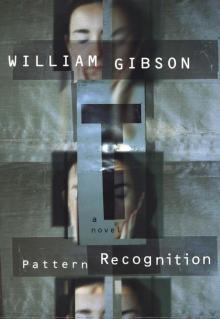 Pattern Recognition
Pattern Recognition Spook Country
Spook Country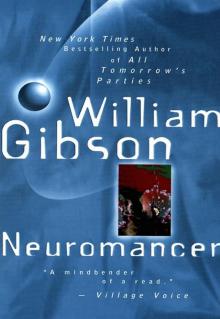 Neuromancer
Neuromancer Skinner's Room
Skinner's Room The Difference Engine
The Difference Engine Mona Lisa Overdrive
Mona Lisa Overdrive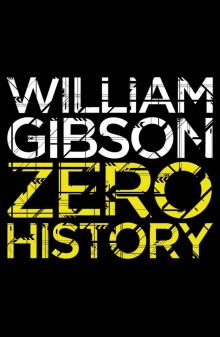 Zero History
Zero History The Peripheral
The Peripheral Idoru
Idoru Johnny Mnemonic
Johnny Mnemonic Count Zero
Count Zero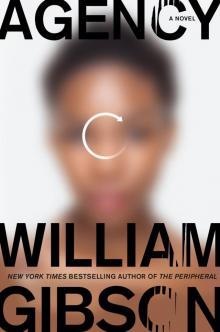 Agency
Agency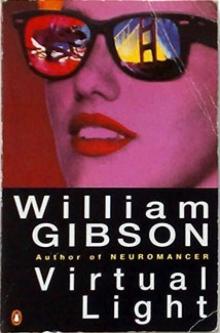 Virtual Light
Virtual Light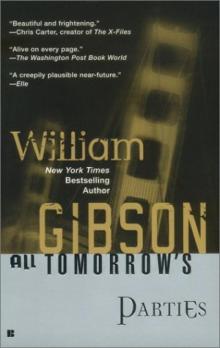 All Tomorrow's Parties
All Tomorrow's Parties The Miracle Worker
The Miracle Worker Disneyland with the Death Penalty
Disneyland with the Death Penalty Idoru tb-2
Idoru tb-2 Count Zero s-2
Count Zero s-2 The Gernsback Continuum
The Gernsback Continuum New Rose hotel (tales)
New Rose hotel (tales)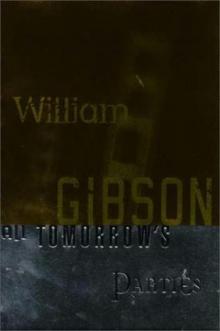 All Tomorrow's Parties bt-3
All Tomorrow's Parties bt-3 Hinterlands
Hinterlands Thirteen Views Of A Cardboard City
Thirteen Views Of A Cardboard City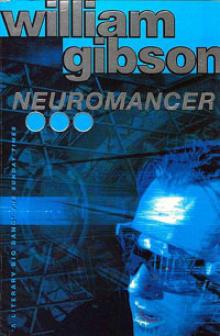 Neuromancer ts-1
Neuromancer ts-1 Virtual light b-1
Virtual light b-1